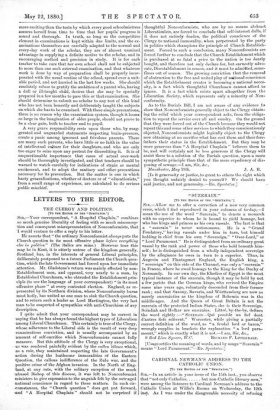LETTERS TO THE EDITOR.
THE CLERGY AND POLITICS. [To THE EDITOR OF THE "apscreros..-] .Sm,—Your correspondent, "A Hospital Chaplain," combines so much genuine liberality of feeling with so much misconcep- tion and consequent misrepresentation of Nonconformists, that 'I would venture to offer a reply to his letter.
He asserts that "the ordinary Nonconformist always puts the
Church question in its most offensive phase before everything -else in politics." (The italics are mine.) However true this may be in Kent, it is utterly untrue of the kingdom generally. Scotland. has, in the interests of general Liberal principles,
deliberately postponed to a future Parliament the Church ques-
tion, which the late Government had forced upon her immediate .attention. Mr. Gladstone's return was mainly effected by non- -Establishment men, and opposed, very nearly to a man, by Established Churchmen, who obtruded the Establishment prin. -ciple (to use the language of your correspondent) "in its most offensive phase" at every contested election. England, as re- presented by its Northern division, where Nonconformity burns most hotly, has united as one man to sink the Church question, and to return such a leader as Lord Hartingtou, the very last man to be suspected of sympathies with anti-Churchism of any description.
I quite admit that your correspondent may be correct in ,saying that he has always found the highest types of Liberalism -among Liberal Churchmen. This certainly is true of the Clergy, whose adherence to the Liberal side is the result of very deep -conscientious conviction, and is usually accompanied by an amount of self-sacrifice which Nonconformists cannot fully measure. But this attitude of the Clergy is very exceptional, -as was rendered painfully evident by the sullen idlenc,e which, as a rule, they maintained respecting the late Government's -action during the loathsome immoralities of the Eastern Question, the callous indifference of the Zulu war, and the positive crime of the Afghan invasion. In the North of Eng-
land, at any • rate, with the solitary exception of the much -abused Bishop of this diocese, it was left to Nonconformist ministers to give expression to the anguish felt by the outraged national conscience in regard to these matters. In such cir- cumstances, the "Church question" does get put forward, -and "A Hospital Chaplain" should not be surprised if thoughtful Nonconformists, who are by no means abaract Liberationists, are forced to conclude that self-interest dulls, if it does not entirely deaden, the political conscience of the Clergy to national immorality, when perpetrated by the party in politics which champions the principle of Church Establish- ment. Forced to such a conclusion, many Nonconformists are forced further to conclude that the Church Establishment which is purchased at so fatal a price to the nation is too dearly bought, and therefore not only declare for, but earnestly advo- cate, Disestablishment in season, and it must be admitted, some- times out of season. The growing conviction that the removal of obstruction to the free and united play of national conscience which the Establishment creates is becoming a national neces- sity, is a fact which thoughtful Churchmen cannot afford to ignore. It is a fact which exists apart altogether from tho Liberation Society, which represents only a minority of Non- conformity.
As to the Burials Bill, I am not aware of any evidence to show that Nonconformists generally object to the Clergy obtain- ing the relief which your correspondent asks, from the obliga- tion to repeat the service over all and sundry. On the ground that they were forced out of the Church because they would not repeat this and some other services to which they conscientiously objected, Nonconformists might logically object to the Clergy now obtaining at no sacrifice what has cost them and their fore- fathers their status in the Establishment. But they may be more generous than "A Hospital Chaplain" believes them to be, and will certainly not be less generous if the Clergy will assist them to a 'solution of the Burials question, upon a more sympathetic principle than that of the mere expediency of dis- posing of sewage.—I am, Sir, &c., [Is it generosity or justice, to grant to others the right which you thought unfairly denied to yourself? We should have said justice, and not generosity.—En. Spectator.]


































 Previous page
Previous page